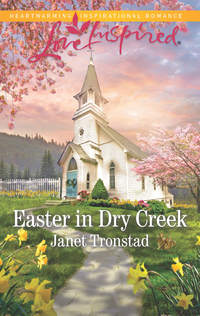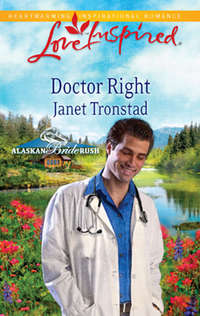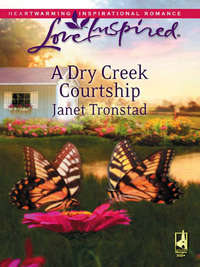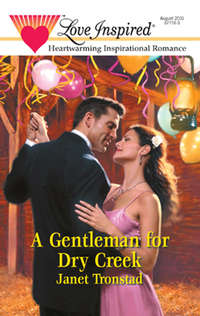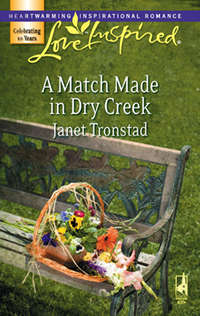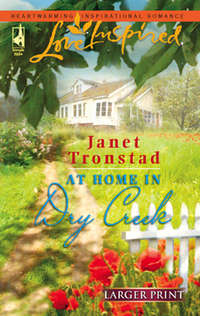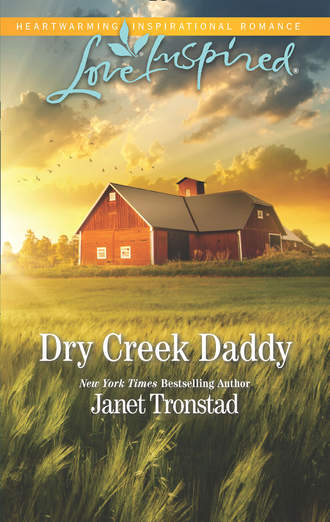
Полная версия
Dry Creek Daddy
* * *
“This is it?” Hannah knew it was the hospital. That much was obvious. But she needed to say something. She’d been frozen in silence on the trip here, and now they were parked in the building’s lot, just sitting there.
“They’re planning to remodel the place,” Mark said as he reached for his door handle.
Hannah turned to unlatch hers, too, and opened the door before Mark felt he had to come around and do it for her. She knew he was just trying to be nice to her, but she didn’t want him to be polite. She remembered how, as a child, she’d felt like an outsider in Dry Creek, believing the town’s friendliness was only for those who had been born there. But once Mark started coming around to take her fishing, she was content. She hadn’t cared any longer if she didn’t belong. One friend was more than she’d ever thought she’d have in life and she liked him.
But then Mark kissed her. Both sixteen at the time, they were standing in the far field checking to see if there were any chokecherries yet on the wild bushes that grew along the fence. The kiss had been an impulse on his part. She was sure of that. He seemed as shocked as she had been. But while he seemed to take it in stride, she felt like she’d fallen off a cliff. Something inside her shattered. After that, she dreamed of a future with him that she’d never given any thought to before that kiss. Suddenly he wasn’t just her friend; he had become as important to her as the air she breathed. She’d never felt like that with anyone or anything before. No one had ever made her feel as safe.
And then—no sooner than she’d become adjusted to her new hopes—he was gone. Almost dead, everyone said. She hadn’t allowed herself to get that close to any man since.
She’d been writing back and forth to Mrs. Hargrove over the years, and the good woman had encouraged her to trust someone, especially God, with her life. A few months ago, Hannah had decided to do that. But relying on God and trusting Mark were two different things. God did not go into a coma when she needed him most. No, she could not face that cliff again. Not with Jeremy being so very sick. She was all her baby had and she could not worry about anyone else, not even herself.
A long hallway ran along the edge of the building, and Hannah saw that the waiting room was crowded. A line had formed in front of the receptionist’s counter.
She and Mark hurried over and joined the people standing there.
“It’ll be okay,” Mark murmured as they started to move forward slowly.
Hannah ignored his words. That was the way it started. A woman would believe some nonsense from the man in her life. And foolishness it was—no one could know if things were going to be okay or not. Mark should realize that. He couldn’t guarantee anything.
Just then the couple in front of them finished their business and stepped out of line.
“I’m here about Elias Stelling,” Hannah announced to a dark-haired woman behind the receptionist desk. “He was in a car accident out on the freeway about—” Hannah glanced up at Mark. “Would you say forty-five minutes ago?”
Mark nodded.
“Is either of you a relative?” The woman looked up from the paperwork on her desk.
“Well, I’m—” Hannah stumbled and paused.
She had run away from the Stelling place when her pregnancy started to become obvious. Her adoptive mother had died of cancer years before and her father still moved around the house like a disinterested stranger, glaring at Hannah if he noticed her at all. She had curled up in a protective ball when Mark went into his coma. She felt like she was in the emptiness with him, waiting to die. But there was the baby inside her, calling her to live.
After the first wave of grief passed, she knew she had to make some decisions. She was brittle and could break at any time. She refused to stay around someone who was supposed to care about her but didn’t. Leaving the Stelling house was a stubborn decision based on hurt, but she knew it was right for her. She was better off in a home for unwed mothers, where she had no expectations of kindness as she did living with her adoptive father. Besides, she knew how to make it in an institution. No one could disappoint her. She never had gotten the hang of being part of a family.
She was taking too long to answer the clerk’s question and the woman was looking at her with suspicion. Hannah straightened her shoulders. The hospital wasn’t asking about the strength of her tie to the man she called Father. All they wanted was her legal status.
She nodded to emphasize her point. “I’m his daughter. His only family.”
Neither one of them had anyone else. Strange as it was, that feeble truth had pulled her back to Dry Creek.
The woman still eyed her skeptically and asked for identification. Hannah pulled out her wallet and flipped it open. “Here’s my driver’s license.”
The clerk seemed friendlier after she’d checked Hannah’s name on the license. “We have to be careful who we talk to. The privacy laws, you know.”
The woman looked down on her desk and pulled a clipboard from the pile in front of her. “The two of you can have a seat in the waiting room. Someone will call your name shortly and then escort you back to your father.”
Hannah nodded. “Thank you.”
Most of the seats in the waiting room were taken. Hannah noticed several mothers with toddlers and was thankful that Jeremy was not here. She was determined to keep him out of hospitals as much as possible. Planning to lead into telling him why, she’d asked if he might want to spend a night in a hospital sometime. The very thought seemed to terrify him. Since then, she hadn’t come up with a good way to tell her son that he would most likely need to do just that because he was very sick.
“How’s this?” Mark asked as he gestured to the two empty chairs in the corner.
Hannah nodded and they walked over to them. She’d have to tell everyone about Jeremy’s leukemia diagnosis at some point, but she didn’t want to do that until she had at least unpacked their clothes and gotten them settled.
She wondered how Mark could know who she was thinking about, but he seemed to because they had no sooner sat down in the chairs than he asked, “Which of these kids is closest to Jeremy’s size?”
Mark seemed a little shy about asking.
She looked up and smiled. The first thing she’d noticed about him when he came into the café earlier was that he was wearing one of his rodeo champion belt buckles. The lights overhead made the buckle sparkle here and there where it hit the brass and silver parts. Mark prided himself on winning those prize buckles and had several. Today, though, he looked like the boy she’d met when they were both ten years old. He had a hank of hair that was unruly. It had always been that way. The rich brown strands curled slightly everywhere on his head, except behind his left ear. Tufts of hair just stuck out, defiant of any comb. Hannah had noticed last year that Jeremy had an identical spot developing on his head.
“The boy holding the orange ball is about Jeremy’s size,” she said quietly.
As Mark studied the child, she looked at him. Apart from the hair problem, he had a stubborn chin. It took the edge off his handsomeness. He had some fine lines on his face now that had not been there before. She wondered if they were from pain. Everyone she had talked to said he would never come out of that coma. When he started to get better, she had called the hospital. The doctors said they needed to be careful about his visitors and only his sister could see him. It had been the amazing story of the week on local news when he moved his finger for the first time, though. She’d wept happy tears for days. It wasn’t until later that she realized everything would not just slip back into place. It could not.
“My sister says Jeremy loves horses,” Mark said. “Maybe you can bring him over to our ranch and he can ride a pony in a few days.”
She’d heard the Nelson horse ranch was prospering now that Mark, his sister, Allie, and his new brother-in-law, Clay West, were all working together. Mark’s father was there, too, but he was semiretired.
“Jeremy would love that,” Hannah said before she realized it could not happen. She didn’t know exactly what his treatments would be, but she figured that, when they were over, Jeremy would be too frail to risk breaking any bones. Even if everything worked, the doctor said Jeremy might be in a wheelchair indefinitely. “It’s probably best to wait a while, though.”
Mark started to say something, but just then a door opened and a nurse called out, “Miss Stelling.”
Hannah looked up. “This way please,” the woman said. Hannah stood and Mark was right beside her.
The lights were bright and a series of doors led off the hallway. Muffled voices seemed to come from everywhere.
The woman motioned for them to stop beside a closed door, and Hannah glanced up to Mark. His face was pale. Those pain wrinkles seemed more pronounced. She reached out and took his hand. They had both lost loved ones in this hospital. His mother. Her adoptive mother. Mark squeezed her hand and didn’t let it go. “We’ll get him well again.”
Hannah couldn’t find her voice to answer, but she already knew she did not agree with his glib response. The coma had protected Mark from the struggles she’d had in the last years. She gently withdrew her hand from his. Mark couldn’t help that coma, but she believed he’d already decided to move away before he got shot that night. He was going away to college. Her son didn’t need to become attached to someone who would eventually leave him.
The woman stepped into the room and then came out.
“You can go in,” she said. “The nurse inside will help you.”
“Thank you,” Hannah whispered.
Light green walls reflected the strong florescent lights. A grunt came from the elevated bed in the middle of the room.
“What took you so long?” a man’s querulous voice accused her from where he lay. Blankets partially hid his face, but she knew him.
Hannah stopped in midstride. Her father had barely greeted her when she drove in last night, saying little beyond directing her to set herself up in the small house near the barn. That’s where the farmhands had stayed when there were any. It was drafty and dusty. It hadn’t been used in years. Her father had no reason to expect to see her standing here now.
“You can’t talk to Hannah that way,” Mark said before Hannah could answer. “You didn’t call and tell her what happened. She didn’t need to come to the hospital at all.”
“It’s okay,” Hannah whispered. She was embarrassed at the gulf between her and her father. But she hadn’t moved back under any illusion that he’d give her a warm welcome.
She’d come because she had no other home. And the part-time job in the café gave her time off so she could take Jeremy to his doctor’s appointments. She’d still be able to work enough hours to buy groceries and, if necessary, pay rent. She reminded herself she needed to find out exactly what her father wanted in payment for use of that run-down house. She prayed it wouldn’t be much; she didn’t know what the copays would be on Jeremy’s treatment yet—or even if their insurance would cover it at all. She’d find out on Wednesday when she took him to meet the physician who’d be treating him.
“No need to be touchy,” her father said, glaring at Mark. “I—”
“We need to decide what to do,” Hannah interrupted matter-of-factly as she stepped closer to her father’s bed. She didn’t have time in her life for this kind of drama. The nurse, on the other side of her father, was setting a glass of water on his table.
Hannah continued, “First off, you were in an accident.”
“I know what happened,” her father snapped. “My brain works just fine—” He looked over at Mark and glared. “Not like some I could mention.”
“That remark is not necessary.” Hannah was appalled at what he’d said. Her father never had approved of her spending time with Mark, but he’d usually avoided outright rudeness. “You should be grateful Mark drove me here.”
She did not know what her father had against the Nelson family, but she wasn’t going to let him make a scene. She stepped even closer to the hospital bed, thinking her father might lower his voice if she did so. The door was still open and she did not want the whole floor to hear him.
He just grimaced at her. “I don’t need anyone hovering over me.”
“Yes, you do,” the nurse informed him briskly. “The doctor means it when he says you need to be watched for at least twenty-four hours. You’ve got a concussion and cracked ribs.”
“I can’t worry about any of that,” he protested indignantly. “I have to get my wheat harvested. It’s going to rain and I’ll lose the whole crop if I don’t get it in. Then how will I pay my taxes?”
“The doctor knows his medicine,” the nurse said with even greater emphasis. “He won’t release you if you’re going to bounce around on farm equipment and do your head more harm.”
“A rancher can’t just ignore his crops,” her father said. “He’ll end up broke.”
“The doctor thinks your health is more important than your crops.”
“It’s my livelihood,” her father persisted.
“And this is your life,” the nurse countered.
The room was silent for a minute while her father tried to stare down the nurse. He didn’t succeed.
“I’ll do the harvesting,” Hannah finally said. “At least today and tomorrow.”
She’d need to be free on Wednesday to take Jeremy to his initial consultation with the new doctor. But she could run the combine tomorrow. She’d helped her father with the farmwork the summer her mother had been so ill. He hadn’t cared about the crops then. He’d sat in the back bedroom by her mother’s side for days.
“You?” her father demanded incredulously. “You can’t run that combine by yourself! Besides, you’d lose that job of yours at the café, and then what would you do? I can’t be supporting you and that sick boy of yours all winter long.”
The silence went even deeper. In the phone call she’d made last week, Hannah hadn’t told her father about the leukemia; she had only said Jeremy was sick. Apparently that had been enough to put him off, though.
“I won’t lose my job,” Hannah said, praying it was true. “Maybe I can start in the fields before it’s light in the morning—”
Mark interrupted, “Jeremy’s sick?”
“I’ll tell you about it later,” Hannah said.
“Of course the boy’s sick,” her father muttered flatly. “What do you expect?”
It took Hannah a minute to realize what her father meant. “What are you saying? That it’s my fault Jeremy’s sick? Because I wasn’t married?”
She knew how the old man thought. He didn’t answer.
Hannah turned to Mark. “Let’s go. He can stay here for all I care.”
Her father’s attitude reminded her of why she’d felt she needed to sneak away from his house. No one at the home for unwed mothers was even pretending to be part of her family. And that meant they didn’t feel they had the right to condemn her, either.
She started walking to the door when she heard Mark speak.
“I’ll run the combine,” he announced quietly.
Hannah went back into the room.
“You?” her father sounded even more agitated as he stared at Mark. “Why, I can’t let a Nelson—”
Hannah stared at the man who had been the only father she’d ever known. She wasn’t the only one he disliked. He wouldn’t ask for help from anyone. He’d locked eyes with Mark and was starting to sit up as though that would prove something.
“You need to get that wheat in a granary soon or you won’t have a crop at all,” Mark said, his voice not rising. “You should have let me help you last week when I offered.”
“You already said you’d help him?” Hannah squeaked, staring at Mark. She could not believe this.
He nodded. “And got cussed out for the effort.”
Hannah glanced over to her father and saw him looking sheepish.
“You refused to let him help you?” she asked. “Why?”
Her father might not ask for assistance, but she hadn’t expected he would turn it down.
“I don’t need him to do anything.” Then, looking belligerent, her father added, “And don’t think I’m going to pay overtime for any twelve-hour days.”
“It’ll be more like sixteen-hour days since you let it go so late, and I’ll not be charging you a penny, you old fool,” Mark said. “You treat Hannah better and don’t say a bad word about Jeremy and we’ll consider ourselves even.”
Hannah smiled slightly. Her father glowered at everyone, but he kept his mouth shut. He was apparently willing to accept help when it was free.
“You’ll keep him quiet and resting?” the nurse asked Hannah. “For at least a full day?”
She nodded.
“I’ll get the doctor, then,” the nurse said. “It’ll take a few minutes to get him ready to leave.”
“My pickup is busted up, too,” her father mumbled as the nurse left the room.
“I’ve got mine outside,” Mark said. “Do we need to call a tow truck for yours?”
Hannah’s father shook his head. “The repair shop has it. I’ll come back and get it next week. In the meantime, we need to take this back with us.”
He pointed to a small cardboard box with a stock number on top of it that was lying at the foot of his bed. “For the combine.”
Mark nodded. “That’s the part you need?”
“Yes,” the older man said. “I made the ambulance guys get it for me before I agreed to go with them.”
Mark bent over and picked up the box.
“You were right, then,” Hannah said to Mark as they exited the room. Together they walked back down the hall. The nurse was planning to bring Hannah’s father to the left entrance when he was ready.
“I’m sorry he’s so rude,” Hannah said. “Hopefully he’ll only need you for a day or two.”
Mark looked over. “You’re not responsible for your father.”
“Maybe not,” Hannah said. “But someone needs to apologize for him. He’s gotten worse. I had no idea.”
“He misses you,” Mark said.
“I doubt that,” Hannah muttered.
She reminded herself that she needed to stay in Dry Creek for only a few months. By then—please, God, she mouthed—Jeremy would be well again, at least if the doctor had an opening and could perform that new stem cell treatment she’d heard about. He’d already done it for others and had wonderful results.
“I’ll pray with you, if you tell me what’s troubling you,” Mark said.
“Oh.” Hannah hadn’t realized he was listening that closely. Her words had been little more than two short whispered breaths. She didn’t want to confess to her troubles, though. Not until she knew if she could trust him.
Finally Hannah nodded. “I didn’t know you pray.”
They had both been in Mrs. Hargrove’s Sunday school class for years, so they knew their Bible stories. But by high school, neither one of them was taking God very seriously.
“You certainly didn’t pray back then,” she added.
Mark shrugged. “Things change.”
She had no answer to that; it was obvious.
“We’ll be back at your dad’s place soon,” Mark finally added.
“He won’t sit quiet,” Hannah warned. “You’ll wonder why you ever agreed to help him.”
“I’m not helping him,” Mark said as he looked over at her. “I’m doing it for you and Jeremy.”
Hannah felt the panic inside. “I don’t need any charity.”
Mark grunted. “Never said you did.”
Hannah almost shook herself. Part of keeping her guard up was to do it so quietly that no one noticed. Mark would be watching her if he thought she was trying to avoid reasonable help.
“I can ask for assistance if I need it,” she assured him.
“Of course.” Mark smiled as he reached for the door.
Hannah let him open it and didn’t say anything. This whole exchange was making her wonder if she could bring herself to ask for help in a crisis. She never would ask for herself, but she would have to ask for Jeremy if he was as sick as he might be. She’d know more after the upcoming doctor’s appointment. For now, she had no choice but to accept Mark’s help, even if it meant she put her heart at risk. She didn’t know how she was going to cope with seeing him every day until her father’s wheat was harvested.
Chapter Two
Mark wished he hadn’t bought the bags of feed that now filled the back seat of his pickup. He could barely smell the fading rose that had been lying on the seat of his pickup. The poor flower had no water tube. He felt a little foolish having it there now that Mr. Stelling was claiming that he needed to ride in the middle of the seat. It was difficult to be gallant and give a rose to a woman when the woman’s father was seated between them. Mr. Stelling had his knee braced against the gear shift and Hannah was huddled in the opposite side of the cab looking like she was weighed down by the troubles of the whole world—not that she would admit it.
Mark figured he’d made a little progress with her, but it wasn’t enough. It had been so easy to be her hero when they were younger. Now she wouldn’t even talk to him.
“You’ll need to get these shocks checked,” Mr. Stelling complained as he pressed his knuckles down on the seat’s padding. “Not very comfortable.”
Mark put his vehicle into Reverse. He turned to give Hannah a quick smile but saw she wasn’t looking his way.
“Dad,” Hannah protested, still looking out the windshield.
“Well, there’s too much bouncing on the passenger side,” her father said as he turned to face her. “A man needs to take good care of his pickup. Mark should know that.”
Hannah turned to look at her father. “It doesn’t matter. He’s doing us a favor.”
Mr. Stelling turned back to stare out the front window.
In all that time, Hannah hadn’t spared Mark a glance.
“Your father just likes to keep me away from you,” Mark said, hoping he’d get a chuckle from at least one of them.
Hannah didn’t turn his way and Mr. Stelling didn’t answer. The other man had a white bandage wrapped around his head, and he was sitting straight in the seat just like the nurse had asked him to.
“Not that I blame him for that,” Mark added.
That didn’t gain him any further response, so Mark kept silent as he made the turn from the parking lot to the main street leading to the freeway.
“I don’t like hospitals,” Mr. Stelling finally said. “They make me cranky.”
Mark figured that was as close to an apology as he’d get from the older man.
“None of us like them,” Mark agreed. They were crowded together in the cab, but at least now it didn’t feel quite as awkward.
Within a few minutes, they were on the freeway and headed back to Dry Creek. There was little traffic. Large empty fields lined both sides of the freeway. Mark refrained from mentioning that all those other ranchers had managed to get their wheat harvested. A herd of deer stood in the distance, grazing. The clouds on the horizon looked darker than they had been. Mark only hoped the rain would hold off long enough to get Mr. Stelling’s harvest done.
“I shouldn’t have made that remark about your head being damaged,” Mr. Stelling offered when they’d driven a few miles. He was silent for a while and then asked, “Did it hurt much all those years you were out of it?”
“You mean during the coma?” Mark turned slightly. It was not surprising the older man would ask about that time. Everyone seemed curious. “No, it didn’t hurt. At least, I don’t think so. I don’t remember much.”
Mr. Stelling nodded. “My wife, she was in a coma a few days before she died.”
“Ah.” Mark understood now. He’d forgotten that fact. “Don’t worry. She wasn’t in any pain.”
A few more miles passed. Mark wondered if he’d always be known as the man who’d been in a coma. People used to say he’d do great things in his life—that he’d be a hero. No one said that any longer. He even had some sensational grocery store newspaper call and offer him a “significant amount of money” to interview him for a story. The thought made him cringe. He didn’t want to be known as the man who had been stuck in a coma for four years. A man needed some dignity.


